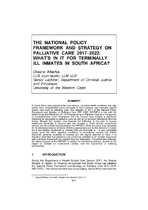THE NATIONAL POLICY FRAMEWORK AND STRATEGY ON PALLIATIVE CARE 2017‒2022: WHAT’S IN IT FOR TERMINALLY ILL INMATES IN SOUTH AFRICA?
Abstract
In South Africa many people suffer from serious, incurable health conditions that may
render them incapacitated and/or terminally ill. Such persons may inevitably require
holistic care such as palliative care. The adoption in 2017 of the National Policy
Framework and Strategy on Palliative Care 2017‒2022 (NPFSPC) in line with the
Health Assembly Resolution 67.19 “Strengthening of Palliative Care as a Component
of Comprehensive Care Throughout the Life Course” thus marked a significant
milestone for advocates of palliative care, as well as for persons affected by terminal
illness. Despite this positive step towards the fulfilment of the right to access
healthcare, terminally ill persons who are inmates in South African correctional
centres are not sufficiently protected by the NPFSPC. While the policy may be lauded
for its detailed provisions aimed at affording appropriate care to free persons, it makes
but a few fleeting references to inmates who are terminally ill – a very vulnerable
group, given the often appalling conditions in correctional centres, the limited
resources generally available to inmates and the stigma attached to them. It is
therefore submitted that palliative care should be available to all inmates diagnosed
with a terminal illness from the moment they are diagnosed. This article also analyses
the stated purpose of the NPFSPC in relation to correctional settings, as well as the
impact of disease on correctional centres, and the importance of fostering
partnerships.

